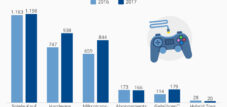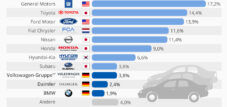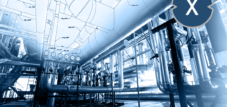Dual-use goods as a beacon of hope for the battered German automotive industry
Xpert pre-release
Language selection 📢
Published on: August 26, 2025 / Updated on: August 26, 2025 – Author: Konrad Wolfenstein

Dual-use goods as a beacon of hope for the struggling German automotive industry – Image: Xpert.Digital
'Dual-Use' as a Lifeline? What's Really Behind Automakers' Flirtation with Armaments
### Tanks instead of Passats? That's why the German auto industry is now focusing on defense ### Tens of thousands of jobs at risk: Can the arms boom stop the German auto crisis? ### The unexpected turnaround: How VW, Mercedes & Co. are fighting their crisis with military technology ### From electric cars to combat robots: The secret plan of the German industrial giants
Billions for armaments, car crisis: A surprising way out for thousands of skilled workers?
Alarm bells are ringing in German industry, but they sound completely different: While profits are collapsing at automotive giants like Volkswagen, Mercedes-Benz, and BMW, and tens of thousands of jobs are at stake, the defense industry is experiencing a historic boom. Driven by the geopolitical shift and exploding defense spending, the defense sector appears to be an oasis of growth in an uncertain economic world. It is precisely at this juncture that a question arises that is as explosive as it is obvious: Can tanks, military vehicles, and unmanned systems be the salvation for Germany's beleaguered key industry?
The figures paint a bleak picture for automakers and their suppliers. Massive profit slumps, shrinking sales, and large-scale job cuts at industry giants like ZF, Continental, and Bosch underscore the depth of the crisis. At the same time, Germany is pumping billions into defense and, for the first time in decades, leads the Western European list of defense spending. In this constellation, so-called "dual-use goods"—technologies that can be used for both civilian and military purposes—are coming into focus.
But the path from the passenger car assembly line to the production of military technology is rocky and complex. Completely different safety standards, lengthy certification procedures, and fundamentally different development cycles pose enormous hurdles. This article examines the opportunities and risks of this potential transformation, highlights which companies like Daimler Truck are already taking the first steps, and why the commercial vehicle sector is considered a promising bridgehead. It is an analysis of a strategic realignment that could determine the future of thousands of jobs and the competitiveness of Germany as a business location.
Can the arms boom solve the car crisis?
Why is the German automotive industry suddenly focusing intensively on defense equipment and dual-use technologies? The answer lies in the dramatic deterioration of the sector's economic situation and the simultaneous boom in the defense industry. While automakers and suppliers are suffering from massive profit slumps and job cuts, the defense sector is experiencing historic growth due to the geopolitical shift. But how realistic is a transition from the struggling automotive industry to the flourishing defense industry?
What are the dimensions of the current automotive crisis? The figures speak for themselves: BMW's profits fell by more than a quarter in the first half of 2025, Volkswagen's by more than a third, and Mercedes-Benz's by more than half. Revenue in the German automotive industry shrank by five percent to €536 billion in 2024. The situation is particularly dramatic for suppliers: Their revenue declined by eight percent, and nearly 19,000 jobs were lost across the entire German automotive industry in 2024.
Which companies are affected by the job cuts? ZF plans to eliminate up to 18,000 of its current 50,000 jobs in Germany by the end of the decade. Continental has already announced the elimination of over 10,000 positions, including 3,000 in research and development alone by the end of 2026. Bosch plans to eliminate several thousand jobs, and tens of thousands of jobs are also at risk at Mercedes, Porsche, and Audi.
The historic upswing in defense spending
How much has defense spending increased in Germany and Europe? The figures show unprecedented growth: Germany's defense spending is expected to rise to €86.4 billion in 2025 – an increase of €14.74 billion compared to 2024. With growth of 28 percent, Germany leads the list of Western European countries in absolute defense spending for the first time since reunification. Military procurement is expected to rise from €15.2 billion in 2024 to €21.64 billion in 2025.
How are NATO spending developing overall? All 32 NATO member states are meeting the two percent defense spending target for the first time. Total NATO spending amounted to approximately $1.185 billion in 2024. In Europe, military spending rose by 17 percent to $693 billion. NATO even plans to increase this to five percent of GDP by 2032.
The challenges of technology transfer
What are the fundamental differences between the automotive and defense industries? The requirements for restructuring are highly complex, and a simple shift in capacity is not feasible. Production safety requirements are different. Certification, testing, and standardization procedures are very different in the defense industry than in the passenger car and civilian commercial vehicle sectors.
What specific certification requirements exist in the defense sector? Companies in the defense industry must hold a number of ISO certifications, including ISO 9001 for quality management, ISO 14001 for environmental management, and ISO 27001 for information security. Additionally, NATO AQAP (Allied Quality Assurance Publications) certifications are required. These standards ensure consistency, efficiency, and effectiveness in the procurement and supply of NATO forces.
How long are development cycles in the defense sector? In the defense sector, it can easily take two years from the application for a project to its launch. In the civilian sector, a project is often almost completed. In addition, there are extremely high requirements for all possible components, and companies must guarantee long service and repair times and maintain long-term spare parts inventories.
Hub for security and defense - advice and information
The hub for security and defense offers well-founded advice and current information in order to effectively support companies and organizations in strengthening their role in European security and defense policy. In close connection to the SME Connect working group, he promotes small and medium -sized companies (SMEs) in particular that want to further expand their innovative strength and competitiveness in the field of defense. As a central point of contact, the hub creates a decisive bridge between SME and European defense strategy.
Suitable for:
Complex mobility: Opportunities for dual-use development
Commercial vehicles as a promising transition area
Which vehicle categories are better suited for military use? Martin Thul of the Commercial Vehicle Cluster Southwest in Kaiserslautern sees a much shorter path to dual-use or military goods for companies in the commercial vehicle sector than in the passenger car segment. Cars are consumer goods and sit idle most of the time. Commercial vehicles are used intensively and are subject to heavy wear and tear – things that are suited to military use. A truck is used for transport, be it people or goods – the latter could be food or grenades.
Which companies are already active in the dual-use sector? Daimler Truck already has concrete plans: Defense-related sales are to double by 2030, after accounting for approximately one percent of total sales in 2024. The company is increasingly focusing on partnerships, for example with ARX Robotics for the integration of robotics and AI technologies into vehicle platforms and with the French military vehicle manufacturer Arquus for the joint development of military wheeled vehicles.
Innovative collaborations and technology alliances
What new partnerships are emerging between the automotive and defense industries? German automakers are exploring cooperation opportunities with defense companies in the field of automated driving. A high-ranking manager at a major German defense company confirmed initial discussions about a potential technology transfer with all German automakers. The focus is primarily on how the automakers' development departments could enable unmanned systems for logistical or support purposes in the military sector.
What is the automotive industry's stance on dual-use goods? Several VW executives fundamentally confirm the transferability of civilian automation technology to military applications. However, weapons technology, munitions, or the construction of offensive battle tanks are considered a red line within the group. VW primarily produces for the civilian market, and dual-use goods play only a minor role. The Volkswagen Group has been involved in the production of tanks and warships since the beginning of the year through its subsidiary Renk.
Regional competence centers and research locations
What regional advantages does Germany have in the dual-use sector? Germany has a locational advantage because of the broad spectrum of specialized companies. "Project alliances are an opportunity for the automotive industry," emphasizes Martin Thul. Suppliers, the chemical industry, IT and software solutions are needed—a comprehensive package. "We have a locational advantage in Germany."
Which companies and research institutions are located in Rhineland-Palatinate? Important players such as Daimler Truck with its plant in Wörth, John Deere in Kaiserslautern, the construction equipment manufacturer Volvo in Konz, and General Dynamics European Land Systems-Bridge Systems GmbH in Kaiserslautern, which manufactures military bridge systems, are located in Rhineland-Palatinate. The German Research Center for Artificial Intelligence (DFKI) and the Fraunhofer Institute for Experimental Software Engineering (IESE) are located nearby.
What makes General Dynamics Bridge Systems a major player? Founded in 1864 as Eisenwerke Kaiserslautern, the company is now the global market leader for mobile bridge systems. As a specialist in the development, welding, assembly, and repair of complex aluminum structures, it employs approximately 400 people at its Kaiserslautern location. The company has been recognized as one of Germany's 100 most innovative medium-sized companies and, with the award as a Leading Employer 2025, is among the top 1 percent of all employers in Germany.
The limits of transformation
How do industry associations assess the prospects of the dual-use approach? The German Association of Automotive Manufacturers (VDA) is rather skeptical. Growing demand from the dual-use and defense sectors is certainly an option for companies with their expertise, "but at the same time, the publicly debated expectations regarding the creation of alternative jobs will most likely prove to be exaggerated."
What structural obstacles exist? The VDA (German Association of German Engineers) is clear: "The potential new jobs will by no means be able to replace those threatened by the transformation and the lack of competitiveness of the region." Karsten Tacke of the Rhineland-Palatinate State Association of Business Associations emphasizes that while dual-use and defense-related technologies in the automotive and supplier industries could open up additional markets, they are not a panacea and do not fit every business model.
Strategic considerations for the future
What role does robotics play as a key technology? The dual-use nature of robotics is obvious: Industrial service robotics and military robotics benefit equally from AI, robust sensors, and increasingly powerful computing power. China is already investing heavily in humanoid robotics with the stated goal of modernizing its own industry, addressing demographic change, and developing robots for military use.
How does modern warfare work in the context of the automotive industry? "War works differently today than it did in the past," says Martin Thul. To be prepared for this and develop appropriate innovations, we need to think across industries, in terms of systems, not individual components. Autonomous systems are playing an increasingly important role in modern warfare, as demonstrated by the Russian war of aggression against Ukraine, where both sides are using, among other things, semi-autonomous drones.
What long-term trends are emerging? A central approach to future industrial and defense policy is a dual-use approach, which, from an industrial policy perspective, should be understood less as technological than as strategic. Modern dual-use strategies aim to systematically exploit synergies to achieve both economic advantages and defense capabilities. With dual-use, Europe intends to strengthen its industrial base without implementing purely military economic stimulus programs—a classic win-win situation.
Realistic assessment of the possibilities
Can the arms boom really solve the automotive crisis? The analysis paints a nuanced picture: While the growth in defense spending is opening up significant new market opportunities and individual companies are already successfully making the transition, fully compensating for the losses in the automotive industry is unrealistic. The structural differences between the two sectors—from certification requirements and development cycles to completely different production standards—make a simple transition impossible.
The commercial vehicle sector appears particularly promising, where technical requirements are more closely aligned and companies like Daimler Truck are already achieving concrete successes. Collaborations with technology companies like ARX Robotics demonstrate how modern dual-use strategies can work: combining basic civilian research with military applications creates innovative solutions that benefit both sectors.
The future lies not in a complete shift from the automotive to the defense industry, but in intelligent dual-use strategies that can serve both markets. Germany, with its broad industrial base, its research landscape, and its geographical location, is well-positioned to assume a leading role in this area. But the transformation will require time, significant investment, and, above all, realistic expectations.
Advice - planning - implementation
I would be happy to serve as your personal advisor.
Head of Business Development
Chairman SME Connect Defense Working Group
Advice - planning - implementation
I would be happy to serve as your personal advisor.
contact me under Wolfenstein ∂ Xpert.digital
call me under +49 89 674 804 (Munich)




















